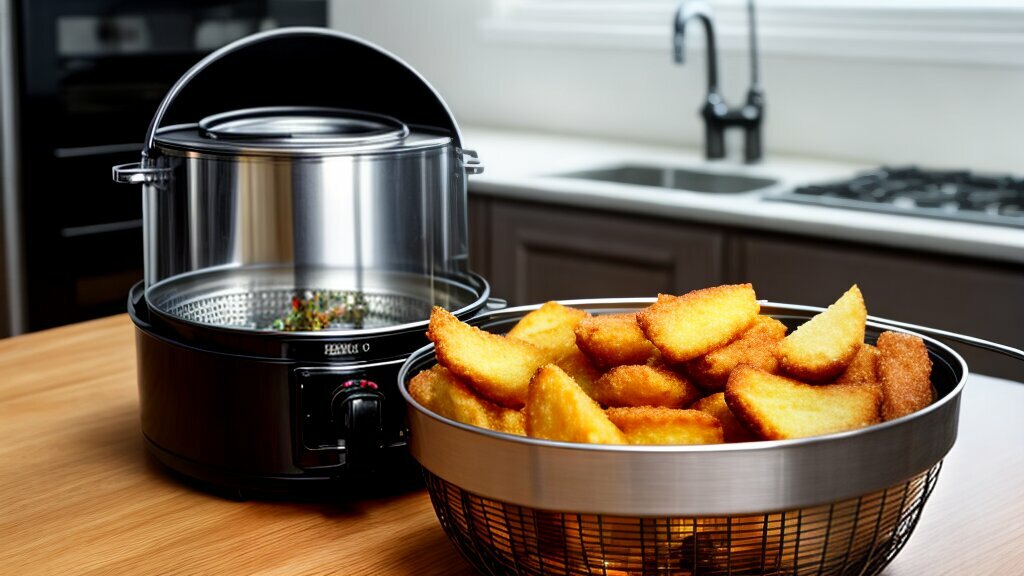
As a professional copywriting journalist and lover of fried food, I know the importance of maintaining the quality of oil in a deep fryer. The question of how long oil can last in a deep fryer is a common one, and it’s crucial to understand the answer to ensure the safety and taste of your favorite fried foods.
Oil lifespan in a deep fryer can depend on various factors such as cooking temperature, type of oil used, and food debris in the oil. Proper oil maintenance is essential for preserving freshness and prolonging the shelf life of deep fryer oil.
In this article, I’ll be discussing the various factors affecting oil durability in a deep fryer, tips for maintaining oil quality, and signs that indicate expired oil and when to change it.
Key Takeaways:
- Understanding oil lifespan in a deep fryer is crucial for maintaining the quality of fried foods.
- Cooking temperature, oil type, food debris, and frequency of use are factors that can impact oil durability in a deep fryer.
- Proper oil maintenance, including filtering, storing, avoiding contamination, and using additives, can help extend oil life in a deep fryer.
- Recognizing signs of expired oil and changing it when necessary is essential for ensuring food safety and quality.
Factors Affecting Oil Lifespan
As a professional copywriting journalist, I know that the durability of oil in a deep fryer is dependent on several factors. Understanding these factors is crucial to extending the life of your oil while maintaining the quality of your deep-fried foods.
Cooking temperature: The temperature at which you cook your food in the deep fryer affects the longevity of the oil. High temperatures cause the oil to degrade faster, shortening its shelf life. To extend the life of your oil, try to keep the temperature at or below 375 degrees Fahrenheit.
Type of oil used: The type of oil used in the deep fryer can also affect its durability. Oils with high smoke points, such as peanut or canola oil, are ideal for deep frying as they can withstand high temperatures. In contrast, oils with low smoke points, such as olive oil, are not suitable for deep frying as they can break down quickly.
Food debris in the oil: Food debris left in the oil can lead to increased oxidation and degradation, reducing its shelf life. To prevent this, filter your oil regularly after each use to remove food particles and debris.
Add H3 tag if necessary: Factors Affecting Oil Lifespan
Frequency of use: The frequency at which the deep fryer is used can also impact oil longevity. The more frequently the oil is used, the faster it will degrade. It is essential to monitor the oil and change it regularly, depending on usage.
To maintain the quality of your oil, ensure that you understand these factors and take the necessary steps to extend its lifespan. By doing so, you can enjoy delicious deep-fried foods while ensuring food safety and quality.
Tips for Maintaining Oil Quality
As a professional copywriter journalist, I highly recommend following these tips for maintaining the quality of oil in your deep fryer:
| Tip | Description |
|---|---|
| Filter your oil regularly | Food debris and small particles can accumulate in the oil during cooking, affecting its quality and taste. Consider using a fine-mesh strainer or cheesecloth to remove these particles from the oil after each use. |
| Store your oil properly | Heat, air, light, and moisture can all impact the quality of your oil. Store it in a cool, dark, and dry place, and avoid exposing it to direct sunlight. Avoid using metal containers, as they can react with the oil and alter its taste. |
| Avoid contamination | Ensure that your cooking utensils and frying basket are clean and dry before using them with the oil. Avoid cooking foods with different flavors and aromas in the same oil. |
| Use additives | Consider using an oil stabilizer or antioxidant to prolong the life of your oil. These additives can help reduce the oxidation process that causes the oil to break down. |
By following these tips, you can help prolong the freshness and quality of your oil, ensuring delicious and safe deep-fried foods every time.
Signs of Expired Oil and When to Change It
As a professional chef, I know how crucial it is to recognize the signs of expired oil in a deep fryer. Using oil beyond its lifespan can not only affect the taste of your deep-fried foods but also pose a risk to food safety. Here are some indicators that it is time to change the oil in your deep fryer:
| Indicator | Description |
|---|---|
| Dark or thick oil | Used oil will darken and thicken over time, indicating that it is breaking down and becoming less effective at frying. |
| Smoky or burnt smell | If your oil smells smoky or burnt, it is a clear sign that it has been overheated and is no longer suitable for use. |
| Foaming | When oil begins to foam during frying, it can be a sign that it has been contaminated by food debris. |
| Off-flavors or off-colors | If your deep-fried foods start to taste or look different than normal, it can be a sign that the oil has gone rancid and is no longer fresh. |
It is recommended to change the oil in your deep fryer after 6-8 uses, depending on the type of oil and frequency of use. However, visual cues should also be taken into account when deciding whether to change your oil. Keep in mind that maintaining the quality of your oil is key to achieving optimal taste and safety in your deep-fried foods.
Tips for Maintaining Oil Quality
Now that we understand the various factors affecting the lifespan of oil in a deep fryer, let’s discuss some tips for maintaining its quality.
Filtering the Oil
One of the most effective ways to extend the longevity of deep fryer oil is to filter it regularly. This involves using a strainer or a filter to remove food debris and other impurities that can cause the oil to break down faster.
Storing it Properly
Proper storage is another crucial aspect of maintaining the quality of deep fryer oil. Be sure to store the oil in an airtight container away from direct sunlight, heat, and moisture. This will prevent oxidation and other forms of degradation that can reduce the oil’s lifespan.
Avoiding Contamination
Contamination is another significant factor that can impact the quality of deep fryer oil. Make sure to avoid using utensils or cookware that may introduce bacteria or other harmful substances into the oil. Additionally, be sure to discard any oil that has been in contact with raw meat or other potentially harmful ingredients.
Using Additives
There are several additives available in the market that can help prolong the freshness of deep fryer oil. For instance, antioxidants such as BHA and BHT are often added to oils to prevent oxidation and extend their lifespan. However, it’s essential to read the instructions carefully and use these additives in moderation.
By following these tips, you can maximize the shelf life of deep fryer oil and ensure that your fried foods are always delicious and safe to eat.
FAQ
Q: How long does oil last in a deep fryer?
A: The lifespan of oil in a deep fryer can vary depending on several factors.
Q: What factors can affect the lifespan of oil in a deep fryer?
A: Several factors can impact the durability of oil in a deep fryer, including cooking temperature, the type of oil used, food debris in the oil, and frequency of use.
Q: What tips can help maintain oil quality in a deep fryer?
A: To preserve the quality of oil in a deep fryer, it is recommended to filter the oil regularly, store it properly, avoid contamination, and consider using additives to prolong freshness.
Q: How can I recognize signs of expired oil and know when to change it?
A: There are certain indicators that suggest oil has reached the end of its lifespan in a deep fryer. It is important to be aware of these signs to ensure food safety and quality. Additionally, changing the oil based on usage and visual cues is recommended.
- Make These 10 Delicious Appetizers in Your Air Fryer - September 22, 2023
- How to Cook Lamb Shoulder Chops in Air Fryer? - September 13, 2023
- How to Cook Crinkle Fries in Air Fryer? - September 13, 2023

